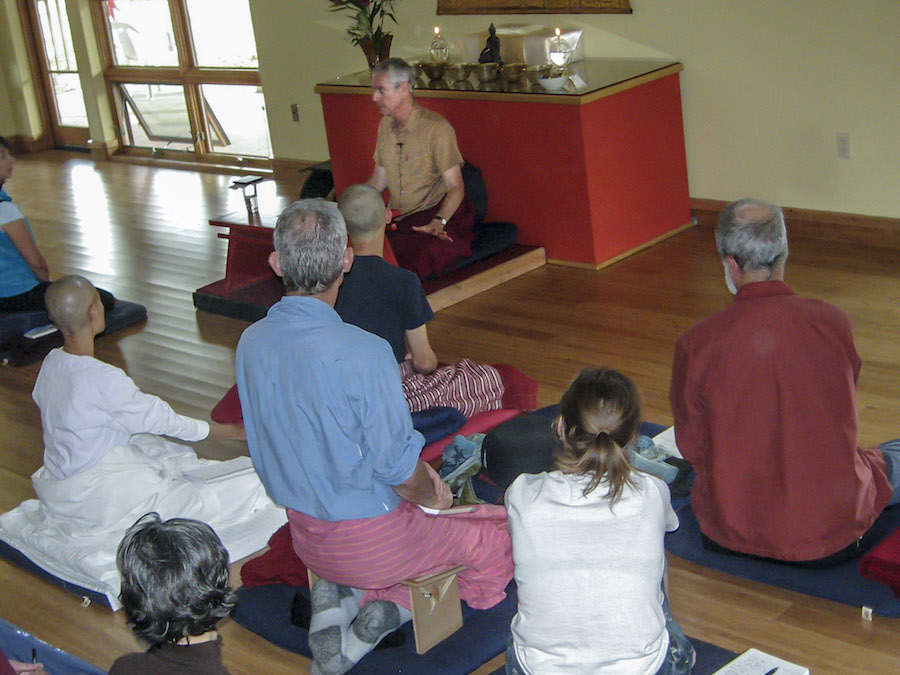
UC Davis study shows the long-term benefits of meditation training on sustained attention, age-related cognitive decline
No matter how hard one concentrates, staring at one point for a long period of time is difficult. Your eyes will flicker to the side or shift perspective ever so slightly. You might not even notice. Eventually, you lose focus. Humans in general have trouble with sustained attention. While some people are better at it than others, their attentiveness will begin to falter after about five to seven minutes. It’s a difficult task and may be more so in people affected by age-related cognitive decline.
“Cognitive decline is a pretty expected pattern that occurs in healthy older adults as they age,” said Anthony Zanesco, a postdoctoral researcher in the Department of Psychology at the University of Miami, in an email interview. “Deficits across a number of different cognitive domains have been seen in healthy adults as they get older. Some of the research on meditation practice suggests that certain practices can be used as a form of mental training that might be able to improve aspects of attention and cognition.”
Meditation has long been known to help improve attention and emotional health through practice. The Shamatha Project, led by Clifford Saron, a professor and neuroscientist at UC Davis’ Center for Mind and Brain, studies the mental and physical effects of meditation. Saron, Zanesco and their colleagues recently published the results of a follow-up study done after an experimental meditation retreat through the Shamatha Project. Two groups of about 30 people, all with previous meditation experience, practiced mindfulness and contemplative meditation under the guidance of a teacher for three months each. The study focused on how well the retreat participants retained the attentional benefits they gained over the months and years following the event. It appears that any sustained benefit depended on how much participants continued to meditate afterward.
“Our findings seem to suggest that the attentional benefits of a meditation practice depend on continued practice, but such benefits likely will plateau without more and more intense and rigorous training,” Zanesco said. ”Like strength training or physical exercise, you might have to put in more and more hours in the gym to see gains from where you were previously — especially if you are experienced already.”
The participants overall had better perceptual discrimination, accuracy and reaction time variability during and at the end of the retreat than at the beginning. Accuracy was also maintained for at least four years afterwards, while improvements in reaction time variability were lost over the follow-ups, which were done periodically at six months, one and a half years and seven years after the initial study. However, those who continued meditating maintained more of their improvement. These gains also appeared to moderate age-related declines in reaction time variability, altering the expected trajectory.
The project not only focuses on attention but also on emotional and physical differences resulting from intensive meditation practice. The scientists collected different kinds of data, from emotional response to bloodwork. The wide variety in age of the participants was useful for a longitudinal age-related survey, so they focused on that information for the purposes of this study. However, the original experiment had a wide focus, partly due to the inherent difficulty of analyzing a spiritual, deeply formative experience like intense meditation.
“There are many different limitations,” said Quinn Conklin, a doctoral student in psychology working with Saron at UC Davis. “Some of those are methodological in terms of the tools we have to measure certain phenomena or processes. Others are conceptual, others are ethical, some are just practical or logistical — you can’t randomize people to be in a meditation condition or not or blind them to the condition that they’re in because it’s generally a practice that they have to engage in and know that they’re engaging in. One of the scientific gold standards that you usually aim for is having a randomized blinded study, which just isn’t very realistic for this type of work.”
It may be difficult, perhaps impossible, to scientifically define what happens during a meditative state, but observing how experiences at the retreat continue to affect participants after they leave helps determine how deeply they were influenced and how they continue to be in the context of daily life. Meditation has been found to be helpful for dealing with various conditions in a medical context, powerful in a spiritual context and unique in allowing people to experience themselves in a different way. The retreat in the study, though intended to be scientifically informative, was the same.
“In the Shamatha project, ever, ever more fine, focused attention was an explicit goal of the three-month retreat that our participants did, but it was embedded in a larger context,” Saron said. “One that included training in loving kindness: wishing for yourself and others to be happy and achieve the conditions of happiness; compassion: wishing for yourself and others to be free from suffering; sympathetic joy: feeling the reality of goodness in other people’s lives and equanimity: understanding that everyone, no matter how close or far from you, is deserving of these first two, loving kindness and compassion.”
Written by: Kira Burnett — science@theaggie.org




Great article! I loooove meditation. Anyone interested in this stuff should definitely check out the book Everyday Roots. It teaches you how to replace all the toxic chemicals in your life with healthy organic alternatives. Its completely changed my life and how I feel everyday! 🙂
Heres a great review of everday roots: http://reggiesreview.weebly.com/everyday-roots-review.html
Keep up the great content!